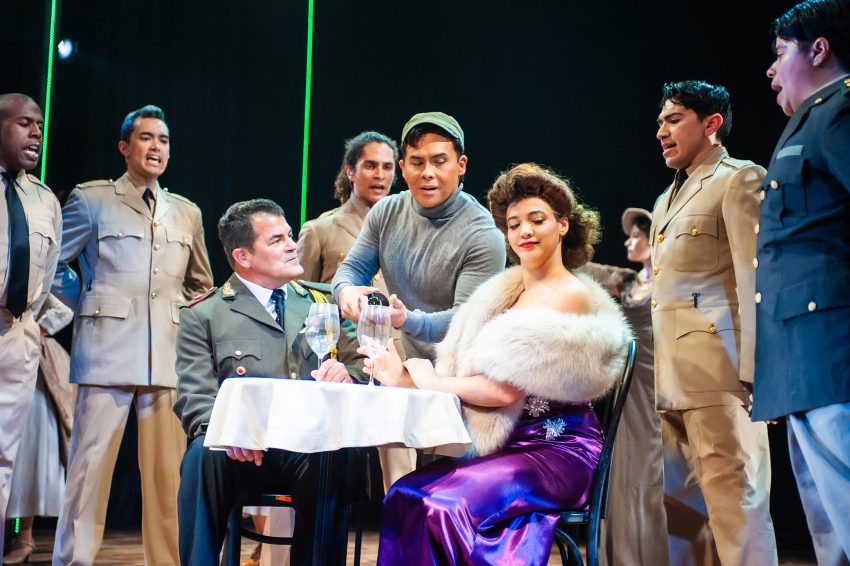
“Evita” Returns, Declaring Devotion to Argentina—at SF Playhouse
Webber & Rice Expose Dangerous Legacy of Perón Era
by Lynne Stevens
A huge screen shows headlines that blast out the news: On July 26, 1952, Eva Perón has died at age 33. Argentines flee their movie houses and crowd the streets of Buenos Aires, mourning Evita. Who is this “Santa Evita” who had such a huge impact on her nation?
In Andrew Lloyd Webber’s 1978 rock opera, Eva (sparkling Sophia Alawi) is sometimes humanitarian, sometimes fascist. But she’s always a fashionista with her hair in a 50s regal pompadour. Her Dior dresses lend her a queenly air, even while Tim Rice’s lyrics show her trading sexuality for power.
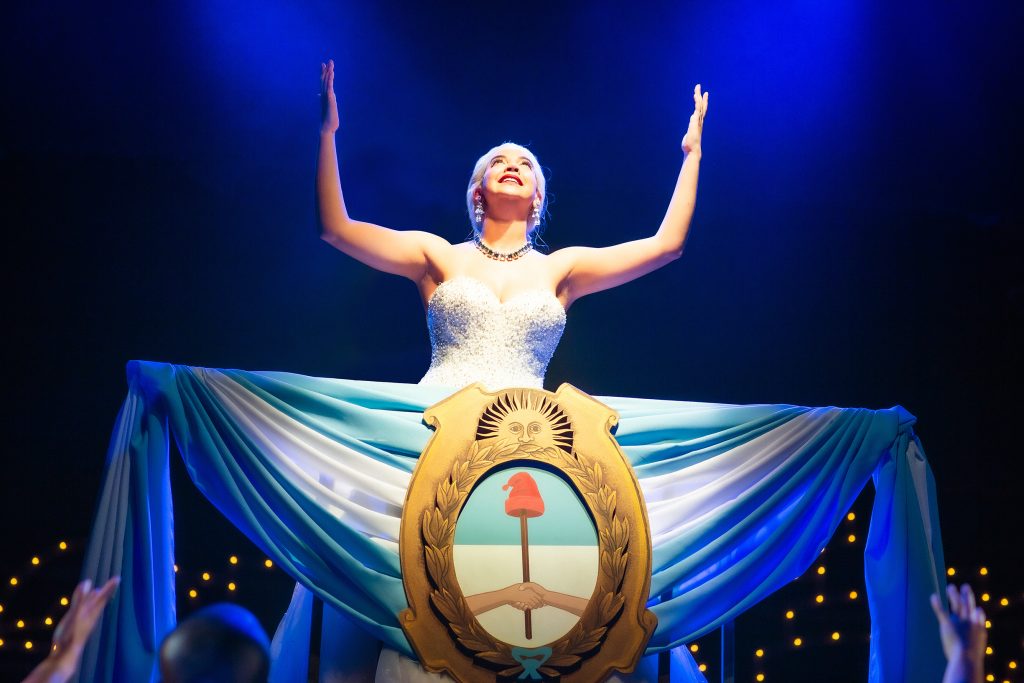
When Eva sings the memorable refrain “Don’t cry for me Argentina,” the song grabs our hearts. She plays royalty to “her people”:
The truth is I shall not leave you
Though it may get harder
For you to see me
I’m Argentina
And always will be
She proclaims herself the face of Argentina. She becomes the rags to riches example of what they can become. She knows how to work the crowd. At the back of the stage, we see the crowd projected in black and white. A reporter records all of Eva’s public appearances. It feels like we are really watching old newsreels.
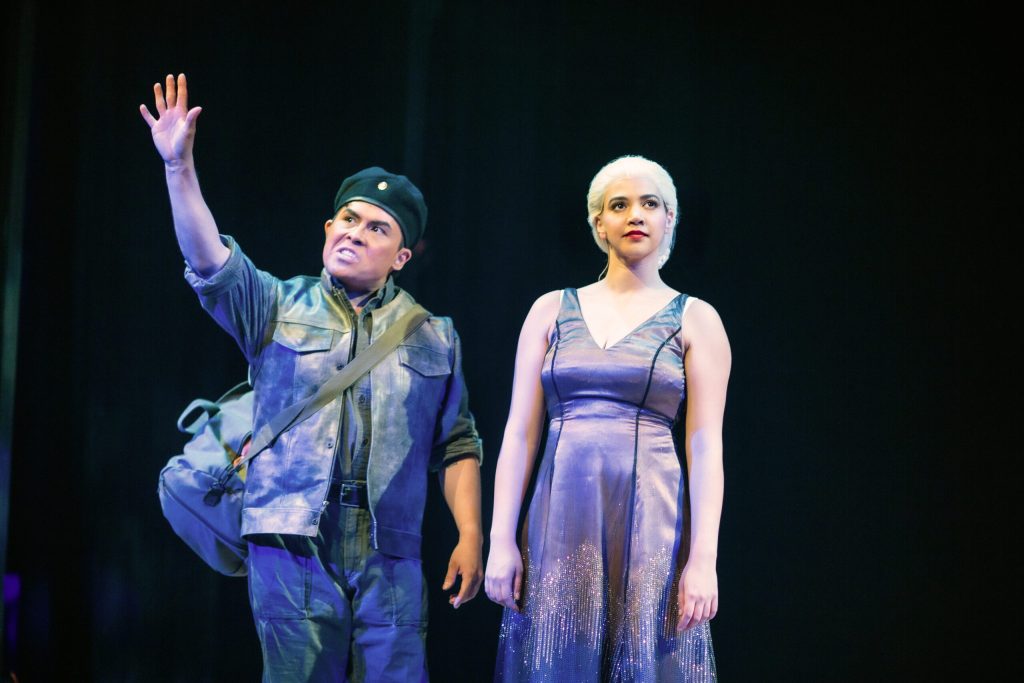
Our guide and narrator is Che Guevara (powerful, earthy Alex Rodriguez), a revolutionary who questions Eva’s ascent and achievements. Rodriguez’ melodious voice resonates with the thumping music of revolution. He casts a doubtful eye on Eva’s ambition.
CHE
Instead of government we had a stage
Instead of ideas a prima donna’s rage
Instead of help we were given a crowd
She didn’t say much but she said it loud
Although they never met, Webber’s Che becomes Eva’s primary critic. Like her, Che also is revered and reviled. Che came from an upper-class family, but he wears a rebel’s costume, while Eva sports French fashions.
Eva’s charisma draws the people to her. She is a poor, striving actress when she first champions Perón to the people. But what exactly did she become?
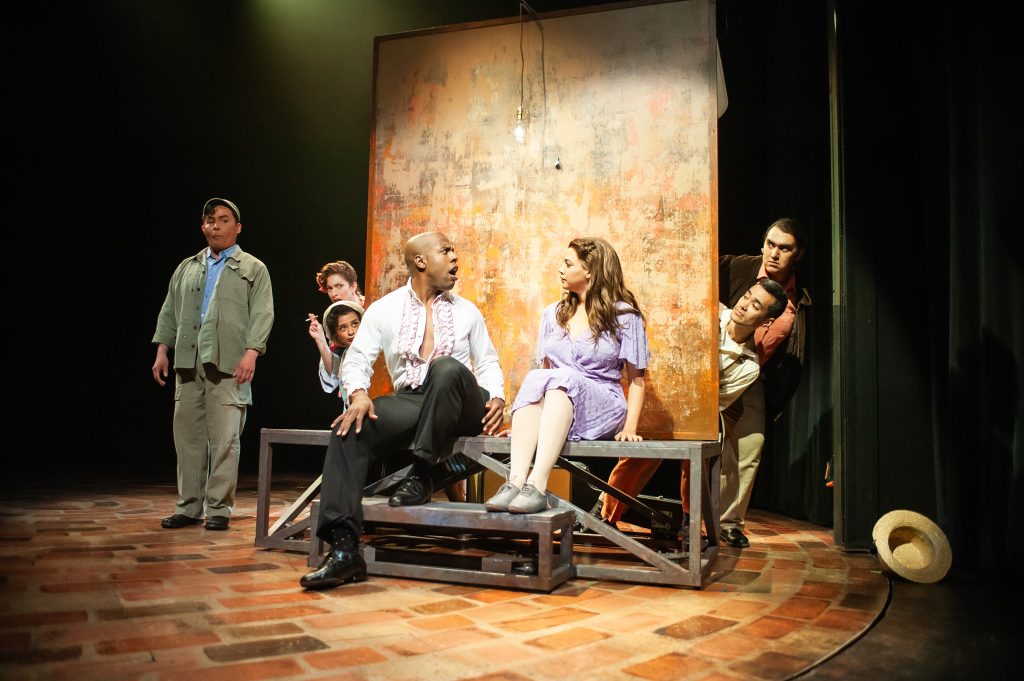
After Eva attaches herself to popular singer, Magaldi (engaging Jurä Davis), she disparages his talents and makes it clear she will move on. She soon rejects him because she burns with ambition for a bigger stage.
In a scintillating night club scene, young Eva plunges into Buenos Aires’ café life, as couples tango across the floor. Dave Dobrusky’s band and the chorus of superb dancers make us eager to join in.
We learn that Eva Perón helped women gain the vote in Argentina. She promotes housing for the poor, provides a path to college education, and builds hospitals. What she did to gain power remains open to speculation. Eva casts a spell over her country:
EVA
Stand back Buenos Aires!
Because you ought to know what’cha gonna get in me
Just a little touch of star quality!
Eva has a huge ego and a strong sense of self-worth. She entertains all kinds of men in her tiny bungalow. A soccer player, a photographer, a military officer. She uses them all as steppingstones.
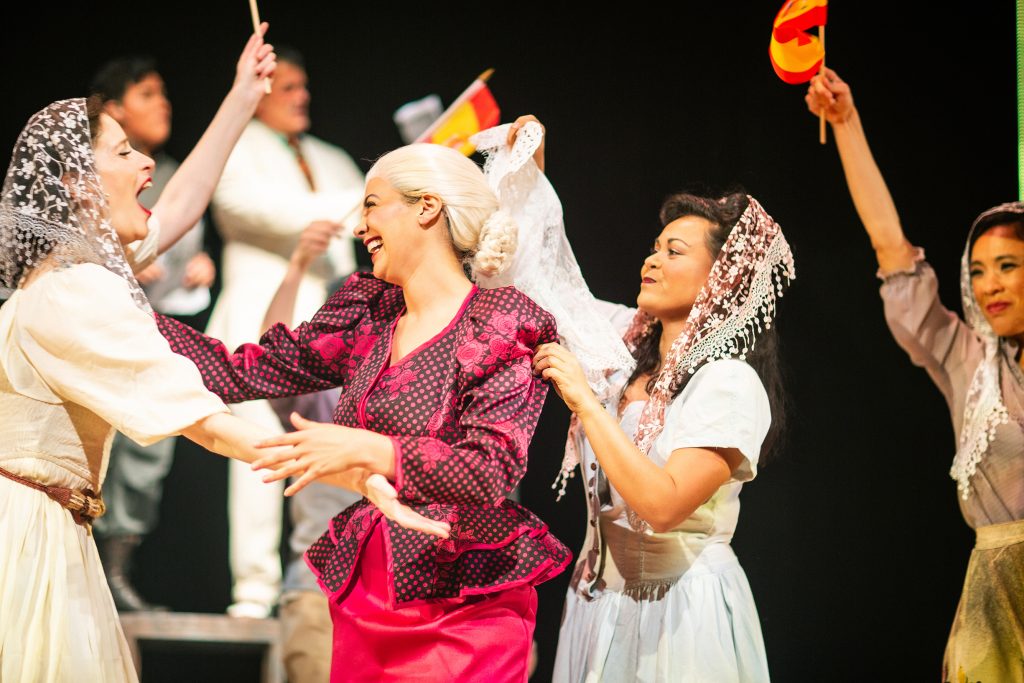
Eva turns on the charm for the lordly Perón, persuading him she will be “good” for his career and soon they are inseparable. Eva uses her art as actor to become his emissary to the people.
EVA
I would never want to force your hand
But please understand
I’d be good for you
Her pleas and arguments, like the music, get repetitive—but they emphasize her ever-growing popularity.
Why “Evita” now? We can see parallels in governments all over the world, with right leaning groups winning elections. Her skill performing on the radio and her popularity with the people she called los descamisados (the shirtless) helped Perón become president.
This show is thoroughly enjoyable with first rate acting, memorable songs and singers, snappy choreography, and stylish costumes. I enjoyed every minute. San Francisco Playhouse has done an excellent job of depicting a complicated woman in difficult times. See it for an entertaining and illuminating look at an extraordinary young woman.
“Evita” –lyrics by Tim Rice, music by Andrew Lloyd Webber, directed by Bill English, music direction by Dave Dobrusky, choreography by Nicole Helfer, scenic design by Heather Kenyon, costumes by Abra Berman, lighting by Michael Oesch, sound by James Ard, projections by Sarah Phykitt.
—at San Francisco Playhouse. Info: sfplayhouse.org – to September 7, 2024.
Cast: Malia Abayon, Sophia Alawi, Christine M. Capsuto-Shulman, Jurä Davis, Chachi Delgado, Gabriella Goldstein, Peter Gregus, César Lino, Catrina Manahan, Dian Sitip Meechai, Deanalis Arocho Resto, Alex Rodriguez, River Bermudez Sanders, Johann Santiago Santos, Nicholas Tabora, and Chanel Tilghman.
Banner photo: Peter Gregus (Juan Perón) is charmed by Sophia Alawi (Eva Duarte), with Alex Rodriguez (Che) & ensemble. Photos: Jessica Palopoli